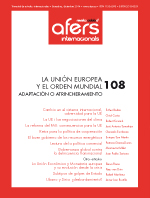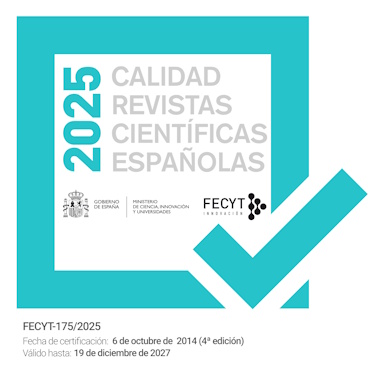The EU in light of IMF reform: loans as a means of entrenchment
Keywords:
European Union, IFM, crisis, hegemonic structureAbstract
Revista CIDOB d’Afers Internacionals, nº 108
Quadrimestral (September-December 2014)
ISSN:1133-6595 | E-ISSN:2013-035X
In 2010, the IMF Board of Governors approved the Fourteenth General Review of Quotas, which proposes significant redistribution of voting power, displacing it from the «over-represented» European states towards the «under-represented» emerging market countries. The results, once the changes are applied, will put the four BRIC countries (Brazil, Russia, India and China) among the ten largest contributors to the IMF. Using the analytical framework proposed by Barbé et al. (2014), this article considers the recent changes in the light of the collapse of the Bretton Woods system in 1971, the transition to soft loans and the restructuring of sovereign debt. Given that the enormous loans to bailout Greece, Ireland and Portugal recommend continuing to use the IMF to promote the interests of the EU, it is argued that it is too early to speak of European decline at the heart of the Fund.
>> The full text articles of this issue are available only in Spanish language
References
Barbé, Esther; Costa, Oriol; Herranz-Surrallés, Anna y Kienzle, Ben. «The EU in an unsettled international system: Coping with the power shift in global governance». Paper presentado en la Conferencia de la International Studies Association (ISA), Toronto (Canadá), 26-29 de marzo de 2014 (en línea) http://www.eu-ianus.eu
Bini Smaghi, Lorenzo. «A single EU seat in the International Monetary Fund?», en: Jørgensen, Knud Erik (ed.). The European Union and International Organizations. Londres: Routledge, 2009, p. 61-79.
Bini Smaghi, Lorenzo. «A Single Seat in the IMF». Journal of Common Market Studies, vol. 42, n.º 2 (2004), p. 229-248.
Breen, Michael. The Politics of IMF Lending. Basingstoke: Palgrave, 2013.
Clegg, Liam. Controlling the World Bank and IMF: Shareholders, Stakeholders, and the Politics of Concessional Lending. Basingstoke: Palgrave, 2013.
Cox, Robert W. «Social Forces, States and World Orders: Beyond International Relations Theory». Millennium: Journal of International Studies, vol. 10, n.º 2 (1981), p. 126 155.
Dreher, Axel; Sturm, Jan-Egbert y Vreeland, James R. «Global horse trading: IMF loans for votes in the United Nations Security Council». European Economics Review, n.º 53 (2009), p. 742-57.
Eichengreen, Barry. Globalizing Capital: A History of the International Monetary System. Princeton: Princeton University Press, 2008.
Frieden, Jefrey A. Global Capitalism: Its Fall and Rise in the Twentieth Century. Nueva York: W.W. Norton, 2007.
Garnier, Carole; Daco, Daniel y Di Mauro, Francesca. «UN-EU cooperation on financial issues: The role of the European Union at the International Monetary Fund and the World Bank», en: Wouters, Jan; Hoffmeister, Frank y Ruys, Tom (eds.). The United Nations and the European Union. An Ever Closer Partnership. La Haya: T.M.C. Asser Press, 2006, p. 115-134.
Gowan, Richard. «The Obama Administration & multilateralism: Europe Relegated». FRIDE Policy Brief, n.º 39 (2010) (en línea) [Fecha de consulta 09.06.2014] http://fride.org/download/pb39_multilateralism_eng_feb10.pdf
Helleiner, Eric. «Political determinants of international currencies: what future for the dollar?». Review of International Political Economy, vol. 15, n.º 3 (2008), p. 354-378.
Ikenberry, G. John. Liberal Leviathan: The Origins, Crisis, and Transformation of the American World Order. Princeton: Princeton University Press, 2011.
IMF. «IMF Executive Directors and Voting Power, and IMF Board of Governors». Washington: IMF, 2014 (en línea) [Fecha de consulta 10.06.2014] http://www.imf.org/external/np/sec/memdir/members.aspx#U
IMF. «IMF Executive Board Approves Major Overhaul of Quotas and Governance». Comunicado de prensa, n.º 10/418 (2010a). Washington: IMF (en línea) [Fecha de consulta 10.06.2014] http://www.imf.org/external/np/sec/pr/2010/pr10418.htm
IMF. «IMF Executive Board Approves €22.5 Billion Extended Arrangement for Ireland». Comunicado de prensa, n.º 10/496 (2010b). Washington: IMF (en línea) [Fecha de consulta 10.06.2014] https://www.imf.org/external/np/sec/pr/2010/pr10496.htm
IMF. «IMF Quota and Governance Reform – Elements of an Agreement». Washington: IMF, 31 de octubre de 2010c (en línea) [Fecha de consulta 10.06.2014] http://www.imf.org/external/np/pp/eng/2010/103110.pdf
Kennedy, Paul. The Parliament of Man, Londres: Penguin, 2006.
Kissack, Robert. Pursuing Effective Multilateralism: The European Union, International Organisations, and the Politics of Decision Making. Basingstoke: Palgrave, 2010.
Laatikainen, KatieV. y Smith, Karen E. (eds.). The European Union at the United Nations: Intersecting Multilateralisms. Londres: Palgrave, 2006.
Leech, Dennis y Leech, Robert. Voting power implications of a unified European representation at the IMF. Londres: LSE Research Online, 2005 (en línea) http://eprints.lse.ac.uk/565/
McNamara, Kathleen y Meunier, Sophie. «Between national sovereignty and International power: What external voice for the euro?». International Affairs, vol. 78, n.º 4 (2002), p. 849-868.
Pisani-Ferry, Jean. «The Accidental Player: The European Union and the global economy», en: Jørgensen, Knud Erik (ed.). The European Union and International Organizations, Londres: Routledge, 2009, p. 21-36.Polanyi, Karl. The Great Transformation: The Political and Economic Origins of Our Time. Boston: Beacon Press, 2001[1957].
Ruggie, John G. «Multilateralism: The Anatomy of an Institution». International Organization, vol. 46, n.º 3 (1992), p. 561-598.
Ruggie, John G. «International Regimes, Transactions, and Change: Embedded Liberalism in the Postwar Economic Order». International Organization, vol. 36, n.º 2 (1982), p. 379-415.
Stiglitz, Joseph. «Is there a post Washington Consensus», en: Stiglitz, Joseph y Serra, Narcís (eds.). The Washington Consensus Reconsidered. Nueva York: Oxford University Press, 2008, p. 41-56.
Stone, Randall W. «Political Economy of IMF Lending in Africa». American Political Science Review, vol. 98, n.º 4 (2004), p. 577-591.
Vreeland, James R. The International Monetary Fund: Politics of Conditional Lending. Londres: Routledge, 2007.
Wade, Robert y Venereso, Frank. «The Asian Crisis: The High Debt Model vs. the Wall Street-IMF-Treasury Complex». New Left Review, n.º 228 (1998), p. 3-23.
Waltz, Kenneth. Theory of International Politics. Reading, MA: Addison-Wesley, 1979.
Woods, Ngaire. «The United States and the International Financial Institutions: Power and Influence Within the World Bank and the IMF», en: Foot, Rosemary; MacFarlene, S. Neal y Mastanduno, Michael (eds.). US Hegemony and International Organizations. Oxford: Oxford University Press, 2003, p. 92-114.
Wouters, Jan y Van Kerckhoven, Sven. «The International Monetary Fund», en: Jørgensen, Knud Erik y Laatikainen, Katie V. (eds.). Routledge Handbook on the European Union and International Institutions. Londres: Routledge, 2013, p. 221-233.
Zakaria, Fareed. «The Future of American Power». Foreign Affairs, vol. 87, n.º 3 (2008), p. 18-43.













